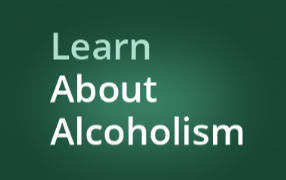Genetics and Alcoholism
A number of scientific studies have verified a link between genetics and alcoholism. The Collaborative Study on the Genetics of Alcoholism (COGA), sponsored by the National Institute on Alcoholism and Alcohol Abuse and the most thorough research initiative to date on genetics and alcoholism, cites compelling evidence that alcoholism does run in families.
COGA notes that children of alcoholic parents, especially sons of alcoholic fathers, are four to nine times more likely to have problems with alcohol than children of non-alcoholic parents.

The inborn nature of alcoholism is further indicated by the fact that children born to alcoholic parents, yet adopted and raised by non-alcoholics, still carry a high risk for alcoholism.
While children born to non-alcoholic parents, and adopted and raised by alcoholic parents, are not at high risk to develop the disease.
They are just as likely to be alcoholic as someone chosen at random from the general population.
“The fact that children with no biological and very little adoptive relation with an alcoholic family member nevertheless resemble their alcoholic parent strongly suggests a strong genetic component in alcoholism,” states COGA.
In addition, COGA reports high rates of alcoholism among relatives of those who suffer from other addictions (e.g., drug or behavioral addictions), as well as high rates of psychiatric problems such as:
depression,
anxiety disorders and
schizophrenia
among alcoholics, suggesting that these conditions may also stem from shared genes and common neurobiology.
Psychiatrists have long suspected that genetics play a major part in determining who becomes an addict and who is able to control his or her addictive impulses.
Nevertheless, COGA emphasizes that those who are vulnerable to alcoholism based on family history are not completely powerless to prevent the illness from coming to fruition. People with a genetic disposition to alcoholism can begin averting the disease by staying away from underage drinking.
The National Institutes of Health (NIH) says research shows that the risk for alcoholism is higher among people who begin to drink at an early age, perhaps as a result of both environmental and genetic factors.
As adults, these individuals should keep close tabs on their alcohol intake or abstain from drinking altogether.
The NIH also recognizes that some people who have a genetic predisposition to alcoholism cannot control the urge to drink.
If they start drinking, even if they wanted to stop before, their addiction may become so strong that it’s impossible for them to limit their alcohol use.
Genetics and Alcoholism Prevention
The NIH recommends keeping healthcare providers informed of family history to so they may closely monitor patients to help them avoid problems with alcohol.
It is important to remember that while alcoholism does appear to run in families, not all children of alcoholics develop problems with alcohol.
The NIH reports that children whose parents are alcoholics are not necessarily destined to become addicted, but they do face an increased risk of developing the illness.
To protect themselves, these individuals should abstain from drinking or limit their intake of alcohol.
COGA also encourages children of alcoholics to get involved with the ongoing research into alcoholism and genetics if they have an opportunity to do so.
An understanding of the genetic factors behind alcoholism may help people prevent or better understand the disease in their own family members.
Alcoholism has a high rate of recurrence among close relatives, with up to four generations affected, notes COGA .
By encouraging interested individuals to participate in genetic research, COGA aims to find more effective treatment strategies and preventive measures.
COGA, for example, has established research sites in New York, Connecticut, California, Iowa, Indiana, and Missouri. The sooner the genetic basis for alcoholism is found, the quicker medications and other preventive strategies can be found to diminish its impact.

Genetics and Alcoholism Treatment
The NIH also recommends that children of alcoholics recognize the importance of their parents’ health and wellness.
Encourage them to lead healthy lifestyles by eating well, exercising regularly, and avoiding excessive use of substances such as alcohol.
Some people who drink heavily may eventually try to stop drinking on their own, or they may seek help from a doctor or mental health professional. Unfortunately, many individuals with alcoholism do not realize they have a problem until it is too late. They should talk with healthcare providers about what can be done if someone has problems associated with alcohol addiction.
Studies show that those who seek treatment for alcoholism fare much better than those who refuse to quit drinking altogether.
The NIH says that people are more likely to stay in treatment for alcoholism if they have family or friends who can encourage them to keep fighting the illness.
Alcoholism often co-occurs with other conditions, such as anxiety disorders.
Both genetic and environmental factors may play a role in this comorbidity, meaning that genes interact with the environment to increase an individual’s susceptibility to developing mental health problems alongside their addiction
At present, researchers do not understand this interaction between heredity and the environment, but COGA suggests that understanding it could lead to improved treatments for many individuals with multiple diagnoses.
While further education on these matters is vital, public awareness about genetics and alcoholism has also increased over the years. This increased awareness will hopefully lead to earlier diagnoses and more effective treatment for this debilitating illness.
Genetics can play a major role in whether or not someone becomes an alcoholic. If you have close relatives who are alcoholics, it is important to be aware of the risk that you may also inherit this disease. For people who have loved ones with alcoholism, take preventative measures by avoiding drinking too much yourself. It is also important to go to doctors regularly so they can check for signs of the illness if any develop later on in life.
Additionally, being involved in genetic research could help others find better treatment methods for dealing with alcoholism. Alcoholism treatment currently has high rates of recurrence, but this hopeful statistic provides more reason than ever before to continue fighting against alcoholism and related illnesses around the country.
If you want to know more about alcoholism treatments and programs available to you, please contact a treatment provider today.

I am a Mental Health Counselor who is licensed in both New York (LMHC) and North Carolina (LCMHC). I have been working in the Mental Health field since 2015. I have worked in a residential setting, an outpatient program and an inpatient addictions program. I began working in Long Island, NY and then in Guelph, Ontario after moving to Canada. I have since settled in North Carolina. I have experience working with various stages of addiction, depression, anxiety, mood disorders, trauma, stages of life concerns and relationship concerns.
I tend to use a person-centered approach which simply means that I meet you where you are and work collaboratively to help you identify and work towards accomplishing goals. I will often pull from CBT when appropriate. I do encourage use of mindfulness and meditation and practice these skills in my own life. I believe in treating everyone with respect, sensitivity and compassion.
I recognize that reaching out for help is hard and commend you for taking the first step. We have professionals available who would be happy to help you move closer to reaching your goals related to your drinking concerns. You may reach these professionals by calling 877-322-2694.
